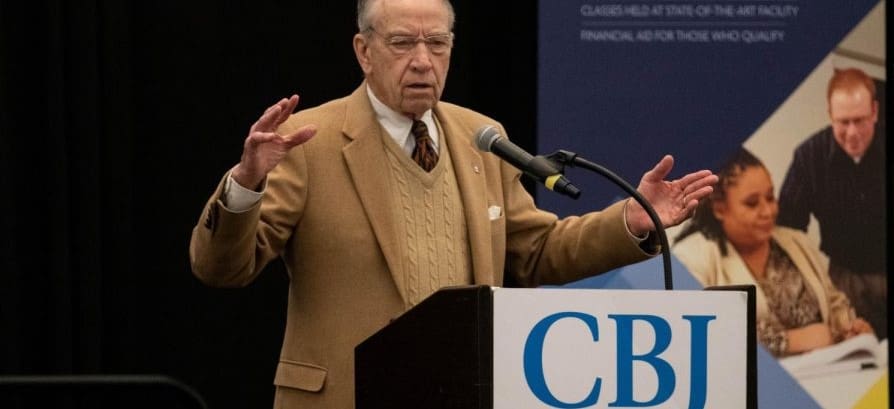One year ago, U.S. Senator Chuck Grassley (R-Iowa) stood on stage at the Corridor Business Journal’s annual Health Care Summit. In his keynote address, he told the crowd about a bipartisan plan to reduce the price of prescription drugs. The bill, according to CBO estimates, would have saved Americans $94 billion over the next decade had it passed. Unfortunately, it suffered from a severe case of bad timing.
During the Q&A portion of his Health Care Summit keynote in February 2020, Sen. Grassley fielded a somewhat off-topic question about the government’s response to a new virus that had reached American shores just weeks earlier. Of course, there was no way the senator could have known the virus would soon bring our country—and its legislative branch—to a grinding halt.
But now, as our world strains under the weight of this terrible pandemic, I was given the opportunity to keynote this year’s CBJ Health Care Summit. With gratitude for the journalistic excellence upheld by the CBJ and its publisher John Lohman, along with the hardworking CBJ events team that included Ashley Moore and Ronda Roskos, I accepted the challenge of trying to put the past year in perspective.
Through the wonders of Zoom, I addressed the conference’s 400 attendees virtually, putting none of us at risk of Covid-19 transmission. In my remarks, I recognized all that this pandemic has taken from us. Over the past twelve months, Covid-19 has killed nearly 500,000 Americans, cratered our economy, subverted our educational institutions, upended our social norms, and wreaked havoc on our healthcare system.
And yet, despite all that has been lost, our nation has gained something vitally important: a renewed appreciation for healthcare professionals.
When the case counts surged in the early months of the pandemic, the internet erupted with images of doctors and nurses donning garbage bags for smocks and salad lids for facial shields. These “frontline soldiers” looked more like a ragtag militia than a properly equipped army. Through it all, news outlets documented their struggles and triumphs. Americans watched from home as physicians with darkened and drooping eyelids fought off exhaustion while continuing to fight COVID-19, risking their lives to save others.
Like their predecessors who battled the Spanish flu and smallpox, the coronavirus fighters stared death in the face and charged forward, not just during the initial wave of hospitalizations but through multiple resurgences of the disease. Their acts of heroism will remain forever imprinted on our national consciousness.
Having acknowledged so much that is positive about the culture of medicine, I acknowledged the other side of the profession.
Although the culture of medicine enables incredible heroics, it is also flawed and filled with shades of grey. Though doctors deserve of our praise, the profession also deserves scrutiny. Physicians today have a surprising disdain for technology, an unhealthy obsession with status, and an increasingly complicated relationship with their patients. These characteristics can be traced back to their earliest experiences in medical school, where doctors inherit a set of norms, beliefs, and expectations that shape almost every decision they make—with both positive and negative consequences for patients.
If we wish to improve our healthcare system and avoid another pandemic in the future, we must diagnose and fix the full breadth of problems in front of us. That will demand a greater focus on disease prevention, increased coordination of medical care, expanded use of modern information technology, and the elimination of clinical practices that have been proven to add no value for patients. These are some of the topics in my upcoming book, “Uncaring: How the Culture of Medicine Kills Doctors & Patients,” which also examines the nine questions all patients should ask their doctors in order to protect themselves from harm and improve their family’s care.
As I noted in my concluding remarks, I hope next year’s CBJ Health Care Summit will take place in person. That will mean the vaccine has worked and that our nation will have begun its march toward recovery and, in time, normalcy.
* * *
Dr. Robert Pearl is the former CEO of The Permanente Medical Group, the nation’s largest physician group. He’s a Forbes contributor, bestselling author, Stanford University professor, and host of two healthcare podcasts. Pearl’s next book, “Uncaring: How the Culture of Medicine Kills Doctors & Patients,” is available for presale now. Follow him on Twitter @RobertPearlMD.







